#this isn’t about u
Text
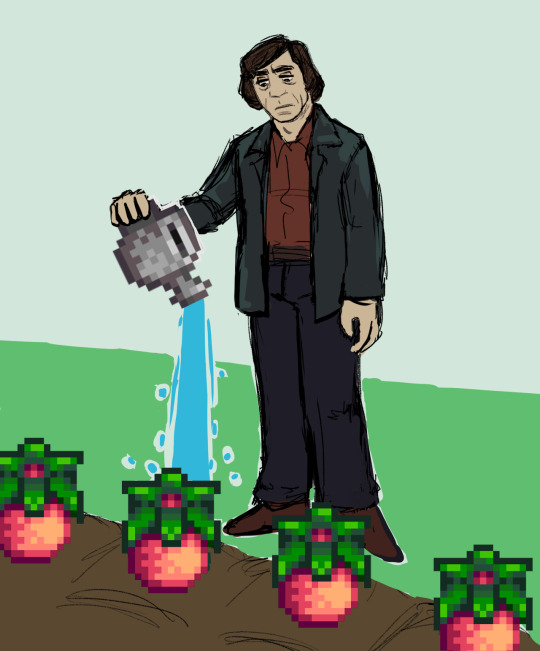
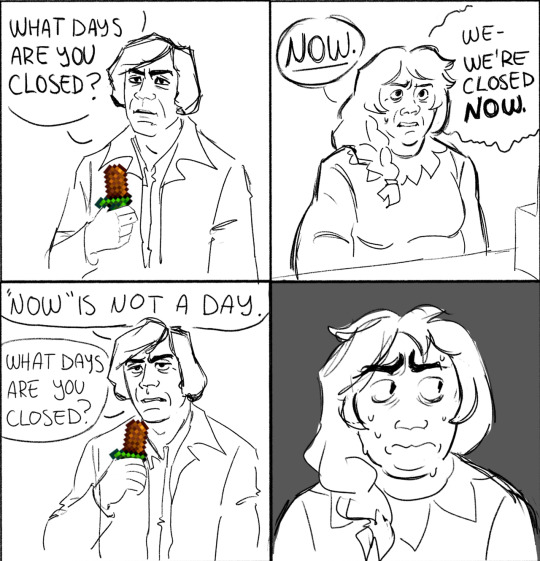
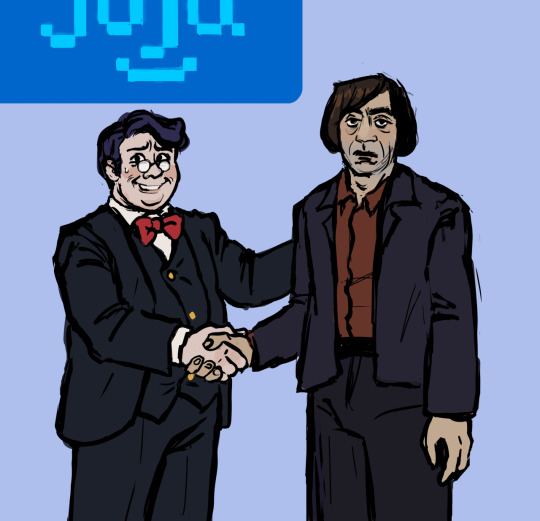
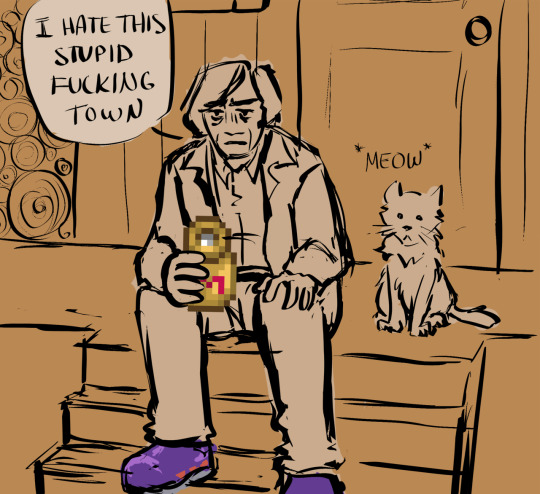
anton chigurh goes to stardew valley
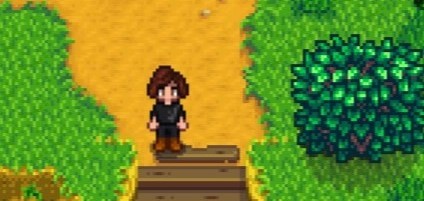
#every1 in the notes asking me why I made this 🙄 art isn’t about why! it’s about why not! why don’t you marry safe art if you love it so much#i got a better shirt for him eventually but i dont have a pic of it#roleplaying as him was the only way i was finally able to bring myself to do joja route#no country for old men#stardew valley#i like to think of him as being magically stuck there for an indeterminate amount of time and trying to survive w/o murdering the whole tow#anton chigurh#marnie stardew valley#i better not see ANY marnie slander!!!#how do u tag them#stardew valley marnie#sdv marnie#morris stardew valley#sdv morris#stardew valley morris#i was not gonna romance anyone obviously but i really enjoyed drawing that pic of him w morris so i got the marry morris mod and it is so#goddamn funny. just the idea of. anton chigurh x morris. me and friends r having the time of our life with it. i even made fanart.#which i may post later if i feel like it#my art#fanart#ncfom
2K notes
·
View notes
Text
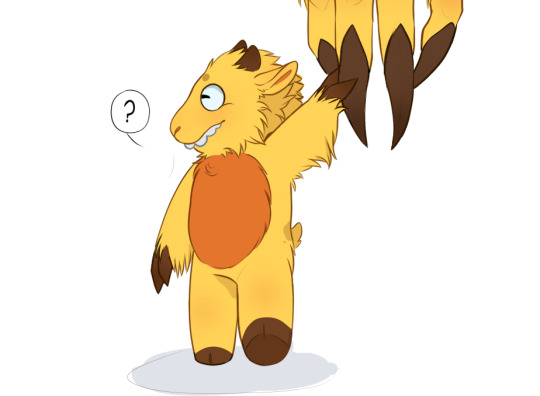
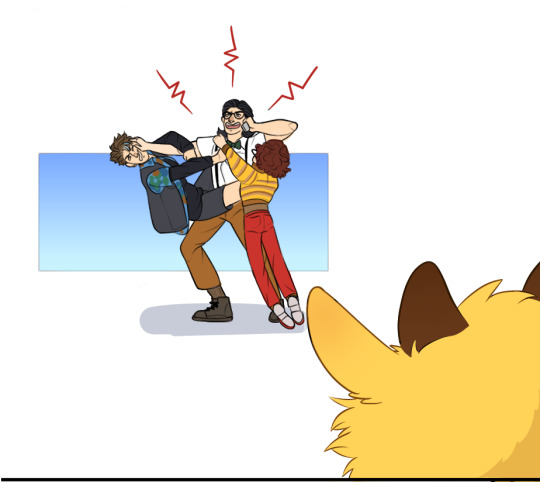
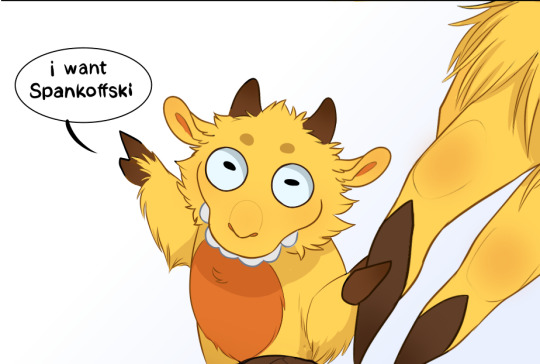
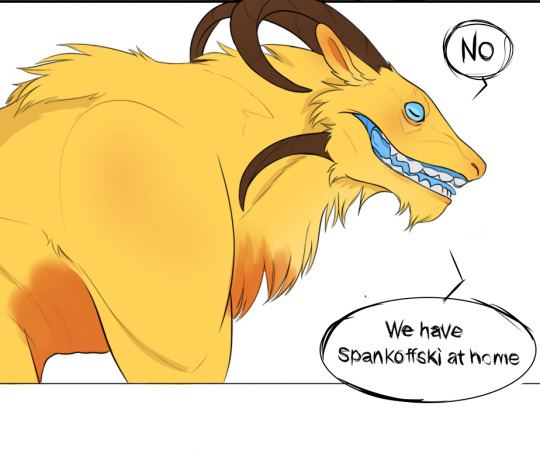

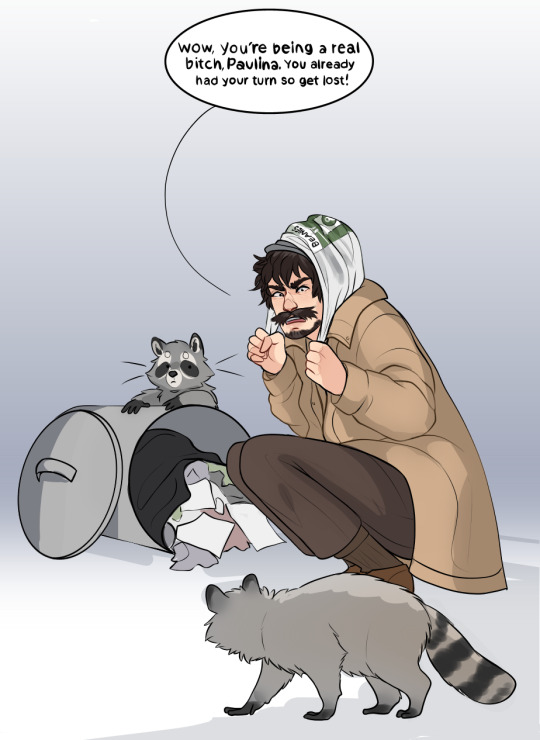
The other one’s name is Wilhelmina
#tries this for a third time c:#did u know goats don’t have upper front teeth??#I mean they aren’t bright yellow either but this isn’t about that#Hatchetfield#Tinky#t’noy karaxis#well this isn’t about anything but fun facts you know#time bastard#nightmare time#tgwdlm#the guy who didn't like musicals#ted spankoffski#peter spankoffski#art#fanart#starkid#another nonsense comic#did you know bill is a nickname for william?#//Komic
1K notes
·
View notes
Text
Prompt 162
“So,” Danny drawled from where he was sitting, legs kicking slightly. Really, what a fun reincarnation. A world with heroes and villains where he didn’t have to do shit in and could just vibe with Ellie.
“So,” Tim responded from where he was typing on his computer, mostly in civilian clothes save for his gauntlets and boots. The Red Robin outfit was haphazardly dropped across the couch and his pole leaning against the end.
“Technically there’s proper procedures for clones…” Danny motioned to both himself and Ellie from where they sat on the counter, snacking on a plateful of scones. From Alfred, he was certain.
“Technically, yes… but do we want to actually do that?”
All three of them smiled, something almost feral in the motion. Of course not. They all had the same memories after all, and Bruce had just returned from the past, from exactly where and when Tim had said he was. Despite no one believing him, hence why they were in his boathouse, and not in the apartment or manor.
“Think we can pull it off?” Ellie took a sip of tea, mischief swirling in her eyes.
“Of course we can.” Both Danny and Tim spoke at once, one pulling up a new doc and the other pulling the whiteboard out from under a curtain.
#dcxdp#dpxdc#prompts#danny fenton#ellie fenton#tim drake#Ras: *Makes Tim Clones*#Danny & Ellie: Lmao we’re gonna blow up this place and go- buh-bye now~#All three of them are salty about the whole time-travelling thing#Tim: Why is one of my clones a girl?#Ellie: Idk man but I’m not changing#Tim: Fair enough do u want me to make you guys proper IDs#They’re going to do mischief and make the Batfam think they’ve always been triplets#They have the paper trail to prove that the Drakes had triplets#Neither Danny or Ellie have powers but that isn’t going to stop them#Nothing can go wrong ever they’re sure#Why yes this is inspired by the Ao3 fic Twincognito Mode#Why YES Bruce does in fact think he somehow adjusted the timeline#And Yes Clockwork does do a little nudge to make their IDs & history *pretty* solid#He's back in Long Now eating popcorn and watching his new favorite show
2K notes
·
View notes
Text

.A trip to Orlais.
#dragon age#hero of ferelden#dragon age origins#dao#zevran arainai#Andrastopher cousland#HoF#cousland#orlais#grey warden#zevran x andrastopher#andrastopher x zevran#mxm#horse#I realise that I haven’t named Andrastophers horse and I should#sometimes I forget Andrastopher isn’t a real name and that I made it up#really want to replay dao and kiss zevran hehehehehe I’m#sure I have a save file with all his important scenes on#also follow ur dreams kid I learnt how to draw horses so u can too 😘#smth smth poetic about Andrastopher being the only person facing away from the light
305 notes
·
View notes
Text
sitcom cold open of two lesbians making out about to have sex and then one of them is like hang on im gonna put on some music and the music is playing and DYKE #1 is like “what is this?” and DYKE #2 is like “oh this is taylor swift’s latest album! she’s my favorite artist 🥰” and DYKE #1 clumsily grabs her things and is like “i just forgot i have a dentists appointment. yeah at 11 pm. sorry i have to go”
1K notes
·
View notes
Text
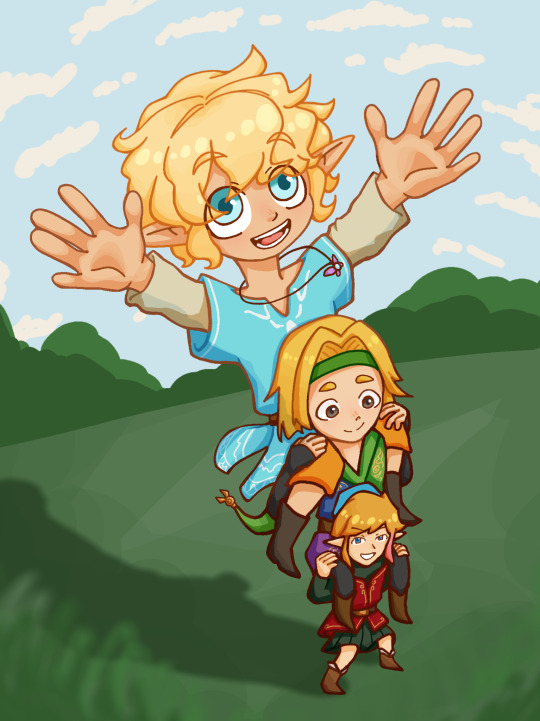
totem time!! for wind week on the lu discord
also inspired by the fic “Rain-Soaked Curls” by @lattewritesthings
…and then i realized the setting and clothes didn’t match the fic
so i also drew a bunch of doodles of moments from it!! :D
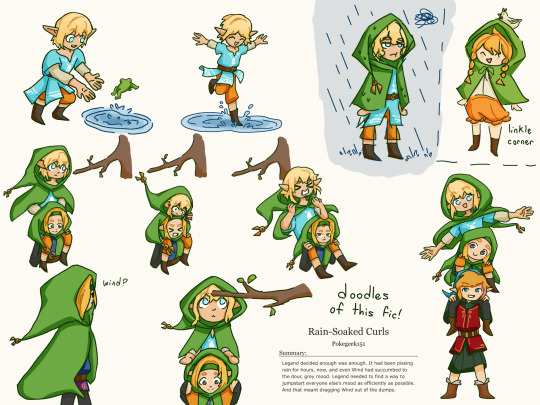
close ups under the cut!
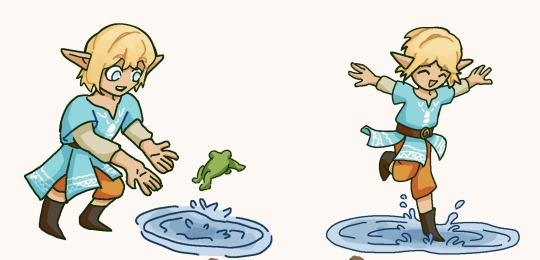
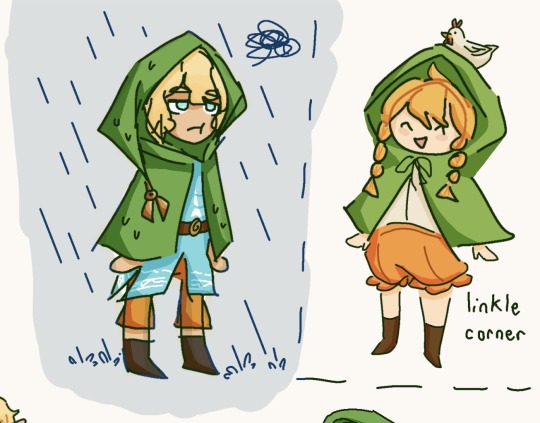
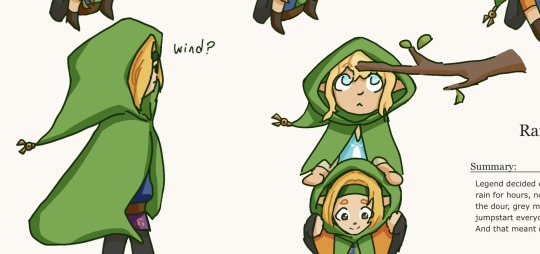
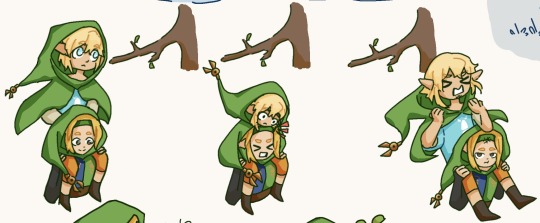
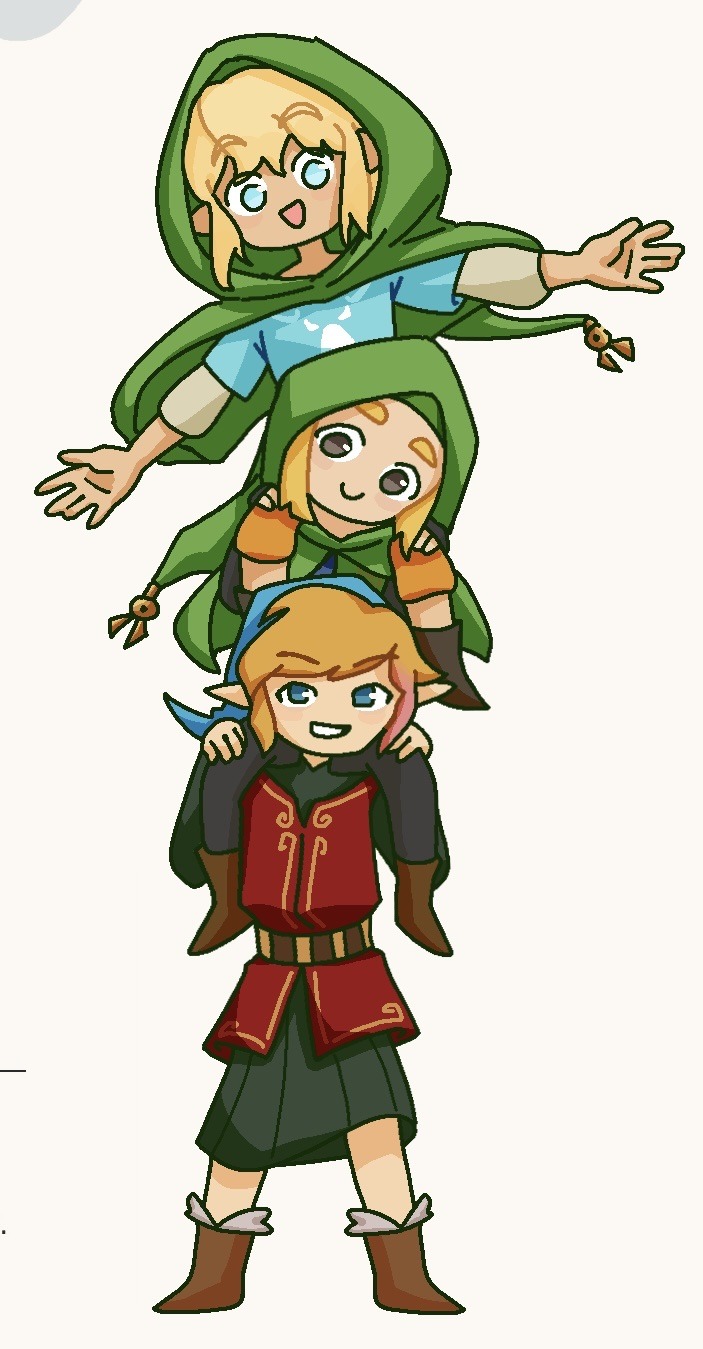
#was trying to practice perspective with the first one so it might be a littleee wonky but that's ok lol#linkle isn’t in the fic btw#but my brother asked me ‘what about linkle’ while i was drawing wind in the top right corner#so i drew a lil linkle :3#also i think the contrast between her and wind in the corner is very funny#anyways hope u enjoy these arts :>#linked universe#linkeduniverse#lu#linked universe wind#lu wind#linked universe four#lu four#linked universe legend#lu legend#piggy draws sometimes
244 notes
·
View notes
Text
there’s a lot of talk about Snow seeing Lucy Gray in Katniss which is true to an extent, but I think there’s a gaping flaw with a 1:1 comparison and it’s this: if Snow truly saw Katniss as Lucy Gray, then he wouldn’t have spoken to her the way he did throughout the series. elaboration under the cut because I have a lot to say
the most interesting thing about snow and katniss’s dynamic is that snow, on some level, respects her because he believes she is like him. Lucy Gray did not have that respect from him—he said it himself that he did not expect her to win the game, but that he hoped she would be successful enough that her appeal to the audience would boost his own standing:
“Coriolanus had never really considered her a victor in the games. It had never been a part of his strategy to make her one. He had only wished that her charm and appeal would rub off on him and make him a success.”
and another quote that makes his feelings toward her clear:
“Here in the capitol, it was given that Lucy Gray belonged to him, as if she’d had no life before her name was called out in the reaping.”
to Snow, Lucy Gray was always a means to an end. he loved her in the sense that he loved the success she brought to him, in a deluded manner where the power and her existence went hand in hand. Lucy Gray’s existence to him was as a tool and something to own, not as an actual person, and when we look at Snow and Katniss, that distinction isn’t there. here’s a quote from Donald Sutherland (Snow) that I find really interesting:
“Katniss Everdeen is the first person who has excited Snow, who has stimulated him. By the time you get into the, maybe the end of the second one, he's in love with her. Not sexually. No, my God, no, no, no, no: he recognizes in her everything that he could have been.”
In Peeta and Katniss’s relationship, through the eyes of Snow, Katniss is him, and Peeta—who is charismatic, knows how to play to the people’s heart, charms the capitol, etc—compares better to Lucy Gray. Yes, Snow places himself in the shoes of Peeta when he asks Katniss when Peeta realized her indifference (as he felt Lucy was indifferent to him), but it really goes the other way around. To Katniss during the first game, Peeta was a tool for her survival. For Snow, Lucy Gray was a tool for his.
despite this comparison, however, Katniss and Peeta are not what Snow and Lucy Gray could have had, but rather what Snow never was; even though the love between Katniss and Peeta was used as a tool of survival during their first game together, they continue to stick by each other and look out for each other as things get rough. Katniss is a survivalist, like Snow views himself, but she is also caring and loving and these are attributes that Snow never had (but someone like Sejanus did). Snow believes that humans are naturally violent, and he believes Katniss is like him, hence why he tries to prove that Katniss and Peeta are not in love at every step of the way.
when he is finally convinced of their love, he then views it as a weakness and punishes Katniss for it. it’s likely he hoped Peeta would kill Katniss, but I would also argue that he wanted Katniss to turn on Peeta too as he turned on Lucy Gray—another effort to break this love that he saw and warp it into something else. ultimately, we know this is unsuccessful, and I think that’s why the final conversation he and Katniss have went the way it did; he had lost at both games, the game of politics to Coin (briefly, though obviously we know he gets the last laugh with this one), and this game of love and identity to Katniss. Katniss is everything he was not, and it was at this point that he finally respected her enough to acknowledge that he lost.
#hence why he tells her about coin etc etc#mind u I’ve only read part of the ballad of songbirds n snakes#n have not. read the hunger games I want to though#I’m going off movies and snippets#the hunger games#ballad of songbirds and snakes#yes there is mockery in the way he speaks to her esp at the beginning#but he still speaks to her one on one which is more than he affords most people#he KNOWS she is intelligent#Katniss isn’t lucy gray but she is the legacy#somethn somethn
368 notes
·
View notes
Text
Dick genuinely doesn’t have a favorite sibling, he’s like the parent that says “I love all my children equally” and you believe it, he actually loves them all equally. He’s been trying to convince them that for the last few years, they don’t believe him, so he does what he has to, he says it’s Steph and let’s her deal with it.
#someone tries to say ‘she isn’t even really ur sister’ and Steph chews them out#‘oh so u think just cuz we’re not blood related we can’t be siblings’#‘oh so you’re calling me unimportant’ ‘oh so yourself saying all I am is a nuisance that hangs around you even though you don’t want me to’#‘oh are you saying I’m a leech that’s sucking off of this family’s happiness and love’#no one ever tries that again after that#so now whenever anyone brings it up all she has to say is ‘why wouldn’t I be his favorite? I’m funny#I’m pretty and I’m the best one here’ and no one can argue with that#so they just don’t#and Steph know she ain’t actually the fave she just lives for the drama#and dck is never bothered about it again#dc comics#comics#robin#batfam#dick grayson#bruce wayne#jason todd#damian wayne#tim drake#duke thomas#cassandra cain#stephanie brown
212 notes
·
View notes
Text
something something zuko’s visible and multiple scars as a visual metaphor for carrying trauma and having people see that and love you for it anyways. is that anything
#I hope this isn’t coming across in like the John Greene 2011 way but like#do u get what I’m saying#anyways there’s no connection to this and why I deeply love and care about him as a character btw#I have no personal stake in this. of course#zuko#atla
298 notes
·
View notes
Note
A (slightly angsty) domestic zukka hc I’ve been thinking abt a lot: I think Zuko would have a sort of knee-jerk flinching reaction when anybody touches his scar (with katara he looks like he’s bracing himself and with mai his whole upper body is sort of being held in place by her) (which i definitely think mai did on purpose to make him feel more comfortable but anyways) I think Sokka would after the first time figure out Zuko flinches hard even when he sees it coming and he’s The Plan Guy so I think he would secretly experiment and find out Zuko doesn’t flinch when sokka drags his hand from a different part of him (like his hair) onto his face. So he just starts doing that and it takes Zuko a stupid long amount of time to realize “hey Sokka touches my face a lot and it doesn’t suck. I wonder why🤨” until one day he figures it out like Sokka you sneaky shit you were nice to me and I didn’t notice
Bc the whole “zuko lets Sokka touch his scar bc he trusts him and he’s super normal abt it” is nice but it doesn’t feel realistic? You can trust someone a whole lot and still have instinctive trauma reactions. I think it’s much sweeter if Sokka notices and figures out a way to make it better without being asked.
Oh….. I’m….. this is a nice one 👍🏼
#ARREGEHSJKASJDASHJDKHGSADJHGSJHGSDMGHASDMHGSAGHMDSAHMGDMHGSAMHGDSGHMADGHMDMHGASMHDAGHMSDJHGDSSJGHSEJHDDSEDSE#?????????#hey anon????#you didn’t think u could get away with this right????#like this isn’t absolutely devastating in the best way possible???? RIGHT#??????#I’m ROLLING AROUND CRYINF SCREAMING WAILING THROWING UP BANGING MY FISTS ON THE WALL???#THIS IS ACTUALLY THE MOST TENDER SWEET ANGSTY THING IVE EVER READDDDD HOW COULD#HOW COULD YOU#HOW DARE YOU DO THIS TO MEEEEEEE#ANON IM PUNCHING YOU IN THE FACE AND KISSING U ON THE KNUCKLES#DASHIUDUKHSADKUHDAKHSUKHUAD#NEVER RECOVERINF BRB 👍🏼#(thank you for your contribution this is beautiful and I’m going to think about this for the rest of my life)#atla#zukka#zuko x sokka#asks#my asks
280 notes
·
View notes
Note
its alright you can just say the truth that its mid
i think it’s a very problematic story disguised as a feminist retelling despite putting down every single woman who does not condone the cradle robber relationship. the justification is that persephone is 18 and ignores that her lover is old enough to be her father and she barely exited teen hood. if she was one year younger then hades would’ve been a groomer, but apparently the added year has made their enormous age gap completely okay. anyone who says that she’s technically a very old goddess remind me of the people who say that lolicon is okay because the 6 year old girl is actually a 1000 year old demon.
it also villanizes a good mother who mourns her daughter’s kidnapping by making her a control freak who won’t let her daughter grow up. ironically persephone is portrayed as naive and easy to take advantage of which completely justifies her mother’s worry. it’s also very creepy how she’s constantly infantilized while also sexualized as if her childlike innocence adds to her sexual appeal
i hate everything about the way her SA was handled, i hate that apollo is a comedically terrible supervillain for absolutely no reason, i hate that the fan base will rip you apart for not worshipping the narrative which is spun out the author’s 7th grade ao3 account. the whole thing is a self insert x mads mikkelsen fanfiction which teaches young women that it’s okay to fall in love with your 35 year old boyfriend because you’re so mature and independent and everyone who tries to protect you is against you. art is cool. wish that not everyone looks like the same person in a different swatch and —
*BANG*
#asks#duckytree#this isn’t a personal attack if u like lore olympus#but it is judgement#sorry i think old men who like young girls are gross#i am around the same age persephone was at the beginning and i can say#there is nothing innocent about the way a man my dad’s age looks at me the way hades looks at persephone#chris hansen bait child syndrome#the fandom terrifies me more than k-pop fans
219 notes
·
View notes
Text
I love ignoring canon like. no he didn’t die. no my favourite characters don’t live in an awful world where everything goes wrong. actually they live in a perfectly normal and peaceful world and live happy lives and none of them r dead :)))))
#this is about peeta and finnick mainly#but also the marauders. like no all three of them did not die way too young what r u talking about 🤨🤨🤨#I decide what’s canon and what isn’t canon thank you very much#especially in my own fics 😌😌😌
134 notes
·
View notes
Text
we’ve all talked about dazai breaking into chuuyas apartment but i want to talk about chuuya breaking into dazais apartment because i’m a visionary. chuuya would absolutely get blackout drunk and pick dazai’s lock bc he remembered something dazai stole from him years ago and wants it back. dazai gets home to a very wasted chuuya with most of his shirt unbuttoned trashing his apartment and shit talking his taste in alcohol and dazai has to take several deep breaths
#dazai staring at his hot almost shirtless mafia ex: think about oda think about oda think ab#ummm you might ask. hey isn’t this cringe? to which i would respond yes leave me alone#playing with dazai n chuuyas relationship like they are my little barbie dolls and i am a deranged 5 yr old#if u r my friend irl and you see this no you don’t.#soukoku#syd text#bsd
621 notes
·
View notes
Text
everyone praises american vandal for hilariously and incisively satirizing the True Crime Netflix Doc formula, but i still think what made it most impressive was the way it thoroughly subverted the Teen Movie genre by simply not being set in a highly stylized borderline-fantastical world of its own rules that overlap extremely little with the actual high school experience. american vandal is the only piece of fiction ive ever seen about high school that truly reflects what high school kids are actually like, and there is something so unique and refreshing about that unflinching realism in a genre that seems to demand absurdism. idk
#u can also say that derry girls is accurate and I agree#but it’s not /about/ high school in the same way AV is#idk I mean I think good teen movies don’t require realism in the slightest#so this isn’t a criticism of that genre#I just love how AV was both a satire and yet deeply authentic#a cool glass of water amidst a sea of daiquiris#o.tv#100
2K notes
·
View notes
Note
For the requests/open inbox, this may not be the lane you're looking for, but you made a throw a way mention in a response to the ask about Ice's enforcement of DADT that Bradley and Ice probably got into it at one point about Ice being totally okay with DADT as a policy (which I love your read on Ice being like, 'yeah, nobody should ask and nobody should tell. what's the problem here?') I would love to see that argument go down. Or honestly, just any Ice and Bradley interaction after the reconciliation that suits your fancy. I find that dynamic in your world super interesting. Bradley sees him as a father, Ice sees him as the person whose father I killed. I love the drama.
Five times Ice was so obviously Rooster’s dad + one time he explicitly wasn’t.
[Carole. 1994.]
He’s such a nervous man. Usually that’s not the word people associate with him. Nervous? Never! But he is. Carole Bradshaw’s more a religious woman than a spiritual one. She’s never put any stock into “chockras” or “ouras” or whatever the other girls her age were fooling around with in the late sixties and early seventies. But she does believe that you can understand a person just by looking at him or her, and when she looks at Tom Kazansky, she sees a little anxious creature, shivering in the cold, like one of those tiny spindly dogs who always needs a sweater. Maybe it’s her southern maternal instincts, something primal and animalistic inside her, I need to take care of you—and when he nudges her with a nervous shivering shoulder and whispers, “Can I bum a smoke?” —she reaches down to take his hand and says, “I only have one left. We’ll have to share.”
She knows she makes him nervous. His ears are red, and so’s the back of his neck. It’s early on a Saturday morning, and the church is crowded, and he’s self-conscious about the fact that she’s holding his hand. Good. It’s so rare she gets to make a man nervous anymore. She waves to Bradley, proud in his little striped button-down and his little blue bow-tie, where he’s lined-up with all the other aspiring pianists against the stage along the far wall, under the bare postmodern crucifix. The recital isn’t going to start for another five, ten minutes, and it’s organized by age, so Bradley’s somewhere in the middle. If Tom Kazansky needs a smoke, Carole Bradshaw will bum him a smoke.
They exit out the side door, and the low murmuring of the other proud parents in the church fades to the quiet of the alley. Birds chirping nearby. The sound of a latecoming car on gravel somewhere far away. Her cigarette and the flick of his lighter, her eyes on his mouth and his puff of smoke—it’s lit. He takes a drag, closes his eyes, then passes it to her. “Sorry to make you share,” she says, and she’s watching the red flush creep up the side of his throat with a silent pleasure. When she takes her own pull, she looks down to see that the filter’s gone the sweet red-pink of her old lipstick. Kind of like a kiss, sharing a cigarette.
“That’s okay,” he says. Nervous spindly little dog. “Uh, what’s he playing?”
“Beethoven. ‘Für Elise.’” Then, before he can think to judge, she goes on quickly: “It’s more complicated than you’d think. Goes up and down and all over the place.”
“It’s a good song,” Tom Kazansky says, “though I don’t know too much about piano.” He pauses. “I’m learning a little German, though. I think it’s E-leez-ah. She must’ve been an alright girl if Beethoven wrote a song for her.”
Carole Bradshaw doesn’t know what to say to that. So she says this instead: “Thank you for coming. It made Bradley—well, over the moon, I guess.”
Tom Kazansky smiles shyly. “Sorry Maverick couldn’t come. I know he wanted to.”
Of course he brings up Pete Mitchell. Drags her back into reality. “He’s in Washington again, isn’t he?”
“Correct.” He reaches out for the cigarette; she gives it to him. “TOPGUN’s biggest advocate. I keep telling him he should go into politics. I just talked to him yesterday—he told me he went to the Natural History Smithsonian on Wednesday—he bought Bradley a dinosaur picture book, I think. Does Bradley like dinosaurs?”
Carole Bradshaw shrugs. What nine-year-old boy doesn’t like dinosaurs, but… “He’s more into sea life these days. Whales, sharks, fish.”
“Some fish used to be dinosaurs, they think,” says Tom Kazansky, clearly just trying to fill the silence. Ears red, lips red. Smoke out of his mouth like a fire-breathing dragon.
Carole Bradshaw doesn’t know how much dinosaur history she actually believes. So she says, “It’s still really nice of you to come. You know, Bradley—Bradley thinks of you and Maverick as his—well, his fathers, I s’pose. So it’s nice for you to be here.”
She watches his reaction—just nervousness. Straight anxiety. He doesn’t meet her eyes, like she’s just kicked him in the ribs. He does not want to be Bradley’s father.
She says, “You don’t have to sign any papers, Tom. You don’t have to put a kid seat in your car. I’m just saying. Don’t worry about it.”
He says, “I can hear the kids starting inside—we should probably go back in.”
So Carole Bradshaw drops the cigarette butt to the ground and steps on it with the bottom of her flat. They go inside, and wait for a kindergartener to finish an overly simple “Canon in D” to take their seats again. She takes his hand. He lets her. After another half-hour, Bradley sits down on the bench in front of the hand-me-down Steinway and busts out “Für Elise” without a single missed note. It still shocks her, sometimes, to watch him play—it still shocks her, sometimes, that she is the mother of all that talent. And now maybe Tom Kazansky is the father of all that talent. How did that happen?
At the end of the recital, Tom Kazansky lets go of her hand. She knew he would. Knew his fatherhood is only temporary. But he lets go of her hand to accept Bradley’s great-big hug in the parking lot: “Gosling, that was so good.” Bradley’s proud smile is missing a few teeth. It makes Tom Kazansky laugh.
And after he drops them off at home, and peels away with a wave and a smile, Carole Bradshaw lights another cigarette from the half-full pack she’d brought with her to the recital and brings Bradley out to the backyard so he can play and she can watch him. But before she lets him go, she looks down at him and says flatly, “If kids at school ask you about Uncle Tom and Uncle Pete—you need to tell them they’re just friends.”
And in his eyes, she can see the confusion of a little boy who hadn’t been aware that Tom Kazansky and Pete Mitchell were anything other than just friends—the confusion of a little boy learning about duplicity for the first time in his life.
“Okay,” he says, so she lets him go.
—
[Maverick. 1998.]
“Don’t go easy on him,” Maverick hollers breathlessly over his shoulder, fishing around in the ice chest in the sand for two cans of Coors; “He just joined the J.R.O.T.C.; don’t go easy on him; he’s tougher than all your squadrons combined; beat him into the dirt…”
“Thanks, Uncle Mav,” shouts Bradley from across the volleyball court, where he’s getting initiated into one of the volleyball teams of younger fighter pilots.
Maverick flashes him a thumbs-up and finds his T-shirt on the first bleacher bench, pulls it on with one hand, and then hops up the rest of the benches to sit with Ice, who’s got his CVN-65 ballcap on and a book open in his lap and is offering informal career advice to one of the other lieutenants: “Yeah, so, in my opinion, it’s all down to what you think you can stomach… If you want me to look over your C.V., I can totally do that—I think I’m free Monday at around thirteen-hundred, if you want to stop in to talk. Not a problem. Not a problem. Alright. See you later.” He watches the lieutenant go, then lolls his head over to look at Maverick, who’s tossing an ice-cold can of Coors up and down. “Hey. Good game. —Coors, Mav? This is an insult.” But he takes the offered can anyway, looking out onto the court, where Bradley—fourteen and just entering his beanpole phase of evolution—is currently spiking the ball. “Cool.” It’s a nice summer Saturday, a casual opportunity for the officers of Miramar to socialize with their families (Ice is wearing a golf shirt and jeans), and by now pretty much everyone knows that Maverick Mitchell’s raising his friend’s kid and that he and Captain Kazansky are good friends, so this is pretty nice. Not much to hide.
“C’mon,” Maverick says, popping open his own can, “you and I were having a scintillating conversation, a few minutes ago.” He’s hunting around for the sunscreen so the tops of his feet don’t burn to ashes in the sun.
“Scintillating. That’s a big word for you. Wow.”
“You’re rubbing off on me, Sir Reads-a-lot—”
“See, that’s funny,” Ice interjects, “because I seem to recall, before you so-rudely interrupted me to go play volleyball with the kids, I was telling you that it’s really not that interesting. It’s actually, Maverick, quite boring.”
“Well, I’m intrigued now. Go on. Finish it off, I wanna know.”
Ice slaps his book shut and gives the long tired sigh of a man who is very self-conscious about the fact that he’s about to turn forty. He pops the tab on his can of Coors and huffs in exasperation when it foams all over his hand. “I mean it, my family history’s really not that interesting. Typical eastern-European immigrant shitshow. U.S. officials change one letter in our last name and everyone loses their goddamn minds… Actually, that story might be apocryphal, I keep forgetting which former Soviet Socialist Republic I’m actually from, I just can’t remember, all the borders got redrawn so many times, one of ‘em…”
Maverick smiles and pulls his TOPGUN ballcap back down onto his head, tugs the brim down low over his eyes so he can tip his head back and not go blind from the summer sunshine. He’d thought Ice would be reluctant to share his family history, but it turns out that most people are just afraid to ask him, and he’s actually pretty eager to talk, if you just ask. Maybe over-eager. He’s rambling. Maverick cuts him off: “Yeah, you do have a left curve to you, don’t you. Genetic.”
The dirty joke strikes Ice dumb for a second, but then he forges ahead, wisely choosing not to engage. He keeps going, oblivious to the fact that Maverick’s not really listening… “Anyway, my grandfather was Jewish, but he died literally the second he stepped foot in America, so it doesn’t count…my grandmother was Orthodox, crazy story how they ended up together; actually, that story’s probably apocryphal, too…she’s the one who raised me, pretty much. I told you that. She brought my dad out to Southern California when he was a little kid, but I don’t know if you’ve noticed, So-Cal’s not exactly the Mecca of Orthodox churches or anything, so he wasn’t very religious at all… My mom was from Milwaukee, I think. Or maybe Minneappolis. Some kinda Protestant. Forget which kind. The preachy kind. But then she died and I didn’t have to go to church anymore, so I didn’t.”
“You just never believed?” Maverick mumbles, half-joking.
“Nah. I mean, I always had too many questions no one wanted to answer. For instance: okay, say you’re bad. Say you commit sin…”
“I’ve never sinned, sir. You’re talking hypothetically.”
“Right. Me, neither. Hypothetically speaking. So you go to Hell. Well, the devil’s there, too, ‘cause he’s a sinner, too. But why’s he want to punish you? What does he get out of it? You’re both in the same boat!”
“Probably a sexual thing,” says Maverick, watching the purple-green imprints of the sun dance around behind his eyelids. “He probably gets off on it. The devil, I mean.”
Ice laughs and laughs. “Sure. Try saying that in front of my mom and see if you survived. I learned pretty early on that they don’t want you to be too curious. So I kept all my questions to myself.” He’s also joking, not taking this super seriously, but that’s a pretty in-character answer. “What about you, Mav?”
“If I’ve told you my family’s history once, I’ve told you a thousand times…” That’s a joke. Maverick’s the one who doesn’t like talking about his family history. Ice hasn’t heard any of it, and for good reason. Maybe someday he’ll tell him about it. “Later. But, remember, I used to be Southern Baptist? Jesus, I was serious into that shit, Ice.”
Ice snorts. “Yeah, right. You.”
“Not joking. I had about eighty girlfriends between fourteen and eighteen, but that’s the most pious I’ve ever been. Lotsa loopholes to make my relationships biblical. Was thinking about being a youth pastor. —I’m not joking. It was my whole personality, for a while. Most of my childhood, anyway.”
Ice is still laughing in disbelief. “Oh, yeah? And then what happened?”
Maverick smiles. “…Got hooked on sinning.”
“…Yeah,” Ice replies, and Maverick can hear the nervous smirk in his voice, “I guess I’d know a little something about that.”
And normally that would be the end of the conversation. But Maverick’s feeling a little sun-drunk, a little giddy, and he’ll never, ever, ever grow out of instigating stupid arguments with Ice just for the fun of it. From beneath the brim of his ballcap he mutters, “…You think Carole’s brainwashing her kid?”
Ice huffs a laugh, and says through a lazy yawn, “I’m not militant in my atheism, no.” But he, also, will never, ever, ever grow out of instigating stupid arguments with Maverick just for the fun of it, and his curiosity’s clearly been piqued. He stews in it for a second before he snaps, “Do you think Carole’s brainwashing her kid?”
“I’m just saying she has him readin’ outta the Bible, like, five times a day. She sends him to church camp. Does something to a kid.” He has no dog in this fight, but this is fun.
“And what did it do to you?” Ice says, reaching down to shove his shoulder good-naturedly. “Weren’t you just telling me not five seconds ago how you used to be the perfect model of Christian charity?” Maverick mumbles a retort sleepily; Ice pushes on through it: “Bradley’s a human being. Either he grows out of it like you did, or he doesn’t, in which case, whatever, land of the free. That’s the First Amendment. You swore an oath to the Constitution. Maybe you should read it.”
“I’ve read it. I’m not Congress, shithead. How’s it go, you want me to cite it to you directly, ‘Congress shall make no law…’ actually, I don’t know what comes after that. Got me there.”
“Don’t call me shithead, dipshit. And whatever. Good thing he’s Carole’s kid and not yours, then. He’s got a mom who wants him to go to church. It’s up to him if he wants to listen to her or not. That’s growing up.”
Maverick tips up the brim of his ballcap to look at him, sprawled out in the bleachers very unprofessionally for the CO of this entire volleyball court, and snaps back, “Well, he’s a little bit my kid. The same way he’s a little bit your kid.”
Ice just flicks his sunglasses down onto his nose and purses his lips and neither confirms nor denies this allegation.
They watch the game together for a while, Ice’s toes pressed against Maverick’s lower back discreetly, trying to work their way under Maverick’s T-shirt. Until one of the young pilots approaches a few minutes later: “Sir!” / “What’s that kid’s call sign again?” Ice mumbles to Maverick, prodding him with his foot. / “Hooker.” / “No shit.” / “Sir!” says Hooker again. / “Which one of us, kid?” says Maverick. / “Captain Kazansky, sir. We’ve got a spot opening up. Wanna play?”
Maverick looks up at Ice expectantly. Ice sighs and harrumphs and waffles for a minute— “I’m too old for this shit.”
“Sir,” says Maverick, “it’s not a competition, but if it were, I’d be winning.”
Lighting the fire of competition under Ice like that is always a good strategy. He rolls his eyes, but immediately stands and tugs off his shirt and rolls up the cuffs of his jeans; “I’ll only play if I can play with the kid.”
So Maverick watches the teams get scrambled again with a smile, and sits up to watch Ice join Bradley in the sand. Bradley’s only just now taller than Ice, and Ice clearly isn’t used to having to reach up to curl an arm around his shoulders to strategize, his eyes narrowed like an eagle’s, staring down the competition. Maverick can read his lips from across the pitch: Alright, kid, I’ve been watching for a while, and I think I know these guys’ strengths and weaknesses…okay, here’s what we’re gonna do… And the game begins when Bradley spikes the ball.
Ice won’t always be this fun, this down-to-earth, this human. The admiralty and the guilt and the grief of the years to come will strip it all away from him, bring him back to the cold, remove him from his own humanity. And maybe, even if it isn’t conscious, Maverick can recognize that, right now, watching Ice dive into the sand with a laugh: this summer sunshine is only temporary. It’s gonna have to end at some point. So he doesn’t take it for granted. He keeps his eyes open and watches and tries to commit it to memory.
And after the game, Ice and Bradley come over so Ice can finish his beer and put his shirt and his baseball cap back on, and Maverick can make fun of them for losing. And: “What were you guys talking about for so long before the game?” Bradley asks Maverick with a grin.
“Whether or not your mom’s brainwashing you,” Maverick says.
“Oh!” Bradley says mildly. “…No, I don’t think so!”
“Oh, that’s a great start,” Ice laughs. “You would’ve made a great Soviet. No, I don’t think I’m getting brainwashed. Hey, by the way, Gosling, if you want a beer, Maverick and I won’t tell anyone.”
“Aw, really?” whispers Bradley. “Thanks, Uncle Ice!” And he races down the bleachers towards the ice chest in the sand.
Maverick watches Ice watch him go, fingers still pinching the brim of his CVN-65 ballcap, clearly worrying about something the way Ice always is.
Then he looks down at Maverick, stares openly for a minute, and says, “You don’t think we’re teaching him to rebel too much, do you?”
—
[Bradley. 2000.]
“Kiddo! You’re here early!” It was Uncle Ice, walking through his own front door, catching a glimpse of Bradley watching the Astros-Nats game on the TV. He was still in uniform, but smiling wide, and he set his bag down near the couch and leaned over to ruffle Bradley’s hair goodnaturedly.
“Practice ended early today.”
“Oh, okay. Cool. Maverick should be home soon, still at work—your mom’ll be here in about an hour—she told me to put the chicken breasts in the oven, but you know me, every time I use this oven I set off the fire alarm, so you oughta help me with that…”
“And,” Bradley said, watching Uncle Ice wash his hands in the kitchen sink, “I got here early because I wanted to talk to you.”
“Oh, sure!” chirped Uncle Ice. Then he paused, sensing a trap. “What about?”
“Advice,” Bradley mumbled. He took a deep breath, and stood to follow Uncle Ice into the kitchen “I was just—I was just curious. If you had any advice for me joining the Navy. You know, with me being gay, and all. How do I—I don’t know. I’ve been thinking about it a lot. It’s kinda been weighing on me. Do you have any advice?”
Uncle Ice was still drying his hands off on a kitchen towel. Rubbing them red and raw. And when he raised his head to speak, there was something dull and startled in his eyes: “I don’t, um—no, I don’t—I don’t know anything about that. —You should ask Uncle Maverick about that.”
“I did,” Bradley said desperately, because he had. Yes, he’d gone to Uncle Mav first. “He—he told me to talk to you.”
“…Oh,” said Uncle Ice, now standing in front of a shelf to return one of his books to it. This surprised him. Maybe hurt him a little. “No. I—I, I wouldn’t know anything about that.”
“But—”
“And there are probably better people to ask than me or Maverick. I—I don’t know—that’s not really my…I don’t know.”
“Okay.”
Uncle Ice swallowed, put the book back on the shelf, then clasped his hands together and set them on the shelf, too, as if leaning over his captain’s desk to chastise someone. He blinked for a long moment. Clearly shifting gears. Becoming someone else so easily. Why couldn’t Bradley do that? “But I can tell you this,” he said, and his voice had gone grave and dim, “and I know you and I don’t always see eye-to-eye on politics—but I can tell you this, professionally, because I respect you, and I care about you, a lot—you’re going to have to keep it a secret.”
Dismayed, Bradley said, “Why?”
“Why’s a funny question to ask about something like this,” said Uncle Ice curtly. He shrugged. “Why? Because it’s the law. That’s why.”
Bradley swung his bat at the hornets’ nest. This was always dangerous with Uncle Ice. “It shouldn’t be a law. Don’t you think?”
“Doesn’t matter what I think. It’s the law. And we get paid to enforce the law, internationally speaking. And the military doesn’t work if personnel refuse to follow the rules in broad daylight. So.” He trailed his fingertip along the spines of all his precious books, then eventually found a different one, started flipping through it absentmindedly. “And even if it weren’t the law, it’d still get enforced extrajudicially. You know what that means?” He did that, when he was intentionally being cruel; used big words that Bradley didn’t know to make himself sound smarter. “It means outside the law. The way people talk to you. The way people respect you or don’t respect you. And this business, the one you want to go into, is all about respect. Being a pilot is kind of like being a knight: you have to be noble, you have to be honorable, you have to respect your service and your adversaries and yourself. And because I respect you, and because I care about you a lot, I’m just telling you the truth—you’re going to have to keep it a secret.”
Bradley blinked. There was something crushing and overwhelming about the truth—maybe the fact that it was the truth, maybe the fact that he hated the fact that it was the truth. It made sense. But it also meant his future was unspeakably bleak. He tried to speak over the lump in his throat when he said, “Yeah. That’s what Maverick told me, too.” And what he’d wanted to hear from Uncle Ice was that Uncle Mav was telling a lie.
Something went soft and slightly wounded in Uncle Ice’s eyes. “I’m sorry,” Uncle Ice said gently. “I wish I could give you better advice than that. But that’s all I know. I don’t know any more than that.”
“Don’t you want to know more than that?”
“No.”
And thus did the generational gap widen into a chasm.
—
[February 2003.]
Dear SN Bradshaw, / Please call/email/write me back when you get a chance. / Love Uncle Iceman.
…
[August 2003.]
Dear AN Bradshaw, / I hope you’re doing all right. I hope at some point you and I can get in touch to talk. Please let me know if there is some other address I should be sending my letters to. I am not sure if they are finding you. / Love Uncle Iceman.
…
[May 2004.]
Dear AN Bradshaw, / I wanted to congratulate you on your acceptance to college. Yours is a very good AE program & you should feel very proud. Please let me know if there’s anything you might need as you prepare to start your first year. / Love Uncle Iceman.
…
[August 2010.]
Dear LT Bradshaw, / I wanted to let you know that I’ll be at NAS Oceana for a conference from December 6-9. I understand that’s your neck of the woods—would you be interested in having dinner with me on either that Tuesday or Wednesday night? I would love to hear how you’ve been doing. You can reach my secretary at the number below. / Love Uncle Iceman.
…
[October 2014.]
Dear LT Bradshaw, / We Maverick and I want to wish you a Happy Birthday 30th Birthday. We heard you are deployed out in the Atlantic now—we hope you will be able to enjoy the enclosed gift card when you make it back to terra firma. Our updated personal cell numbers are below. / HAPPY BIRTHDAY! FROM UNCLE MAVERICK & Uncle Iceman.
…
“Haven’t heard back from the kid yet.”
“…You think we ever will?”
The longest silence.
—
[Pacific Air Type Commander Beau Simpson. 2016.]
You could see it in the way they held themselves. An utmost similarity. Aristocratic propriety. Maybe a little sense of entitlement: look how hard we’ve worked to be here. All three of them had it. More accurately: Captain Mitchell and Admiral Kazansky both had it, and had passed it down to their son.
“Captain Mitchell.” Everyone was watching. The sun had only just set; the sky was melting from horizon-red through orange and yellow and teal up to midnight black above them.
“It’s an honor, sir,” said Captain Mitchell, accepting Admiral Kazansky’s handshake. God, you’d never know it by looking at them. Half the people here on this Roosevelt flight deck knew about them, but they were so convincing that more people weren’t sure. TYCOM Simpson glanced at Rear Admiral Bates, who glanced back in confusion—I thought they were…? They were, TYCOM Simpson signaled, just abnormally good at keeping it a secret.
“Honor’s all mine, Captain,” said Admiral Kazansky, and he passed by without a second glance.
And when he made it down the line of aviators to Lieutenant Bradshaw—you could see it. The similarity in the way they held themselves. Straight and rigid and unyielding. Cold and dismissive beyond belief, even to each other. Admiral Kazansky held out a hand. Lieutenant Bradshaw took it, but refused to make eye contact. Quiet rebellion under the radar: Admiral Kazansky had taught him well.
TYCOM Simpson glanced at Captain Mitchell, to gauge his reaction. And for once, he and Captain Mitchell were clearly thinking the exact same thing.
Like father, like son.
You could see it in their stubborn determination. How far they were willing to go. How hard they were willing to push. How long they were willing to hold their own hands to the fire, if it meant the familiar painful comfort of staying warm. “Ice-cold, huh?” TYCOM Simpson asked him the next morning, trying to pin down their strategy, trying to secure a guarantee that their family would do what their country asked of them, even if that meant death. Even if that meant the ultimate sacrifice.
“Only when I have to be,” replied Admiral Kazansky, which meant always, and—soon thereafter, he ordered Lieutenant Bradshaw to his death.
But also, Lieutenant Bradshaw went willingly, too.
“Dagger One is hit.”
“Dagger Two is hit.”
Loss is supposed to hit a man in stages. Isn’t that the truth? —Not so for Admiral Kazansky, whom grief obviously swallowed whole in just an instant. He did not break, or bend under its weight. Just stood there staring at the E-2D AWACS screen with wide wounded eyes—not disbelieving eyes. They were gone. Captain Mitchell and Lieutenant Bradshaw were gone. He was in no denial whatsoever. He had leapt straight to acceptance.
“Sir,” said TYCOM Simpson hesitantly, and he reached out to touch him—the stars on his shoulder—guide him back to reality—what must it be like, to lose a son?—to willingly forfeit your family?—
But before he could make contact, Admiral Kazansky drew a breath, moved away, and closed his eyes for just a second. Perfectly composed, even with the waters of grief closing over his head, even with three dozen observers in this C2 room all scrutinizing him for his response. Perfectly composed. How did he do it? How could he manage? How was he possibly still this proud?
“Vice Admiral Simpson,” he said calmly, “I relinquish my command to you, until you deem me necessary to return to my post.”
“Sir,” said Rear Admiral Bates, darting panicked, sympathetic eyes to TYCOM Simpson, but it was too late—Admiral Kazansky was already leaving the room. Head held high and steady.
Some confusing weeks later, after Captain Mitchell and Lieutenant Bradshaw returned from the dead, TYCOM Simpson and Rear Admiral Bates would casually debrief the mission together in the lobby bar of the Waldorf-Astoria in Washington, D.C. No hard liquor, just beers. Just barely enough alcohol to give them an excuse to philosophize. “You think pride is a sin or a virtue?” TYCOM Simpson found himself asking, tracing the rim of his gilt-edged Stella Artois glass with a finger, after having recounted the above testimony.
“Neither,” said Rear Admiral Bates. “Gotta be a vice.”
“A vice.”
“Yeah. Good men die because of pride, bad men die because of pride…we send our sons to battle because of pride…wars are fought and won and lost because of pride… every war in human history, when you boil it down, begins when someone says, ‘You’re wrong and I’m right, and I’m proud of my own righteousness, proud enough to kill, proud enough to die, proud enough to send my sons to die…’”
“Oh, okay. That’s the root of all human conflict, then, according to you, Warlock. Okay.”
Rear Admiral Bates smiled and laughed at himself, too. Pride, he mouthed. Then shook his head. “We’re a proud species. It’s our vice.”
TYCOM Simpson was thinking about the two proudest men he knew, Admiral Kazansky and Lieutenant Bradshaw, and wondered what it was, exactly, that had driven a wedge between them, you’re wrong and I’m right and I’m proud enough of my own righteousness to send you to your death/inflict my death upon you… And then he remembered the warnings he’d previously received about Lieutenant Bradshaw and Lieutenant Seresin and their open relationship, and then he remembered Admiral Kazansky coldly shaking Captain Mitchell’s hand… and he wondered if the wedge between them was exactly that: the matter of pride.
—
[Tom. 2018.]
“Merry Christmas and a happy new year, and all that,” says Pete, raising his glass and reaching over the dining table to clink rims with Tom and then Bradley. “A good year! A really good year! —Sorry your guy couldn’t be here, Rooster. We’ll call him tonight before you go. Tell him we miss him.”
“Where is he again?” Tom asks.
“Washington,” Bradley says with a smile. “Big conference at the Pentagon. I’ll see him next week.”
“You know,” Pete says with a sly grin directed at Tom, “I’ve never actually heard the story of how you two got together.”
“Oh,” Bradley says, shrugging as he tears open a dinner roll, “not that interesting. Pretty much what you’d expect. Inter-squadron competition-turned-sexual tension. Not exactly within regs, but we did meet each other before D.A.D.T. got repealed, so it wasn’t like we’d’ve ever been within regs, either…” (All the while, Tom’s smirking over the rim of his wine glass at Pete, No, Mav, I’m not gonna tell him I had them reassigned to the same boat…) “We broke up when I got sent to TOPGUN. But we figured it out eventually.”
“Glad you did. Sorry he couldn’t be here.”
Bradley hesitates, then says, “You know what I just realized? I never heard how you two got together…! You’ve never told me that story!”
Tom glances over at Pete, do you want to take this or shall I, and when Pete motions all yours, he sighs and says, “Uh, we don’t really know. We’ve just been telling people nineteen-eighty-six because it’s easy. But in a much more real sense…” He thinks about it, then shrugs. “Whatever. If you really want to know. In nineteen-ninety-three, right after I came back to San Diego to take command at Miramar, he and I had a drunken one-night stand. By accident. Which then turned into twenty-five years of accidental one-night stands. So.”
“Oh, c’mon. You guys bought a house together.”
“Yeah, that,” says Pete, “that was, uh, to facilitate the accidental one-night stands. Make it more convenient for everyone.”
“Cut out the middle-man,” Tom supplies, then shrugs again at the look on Bradley’s face. “That’s our story, kid. It’s not super romantic. We weren’t thinking about it that way. We didn’t know how.”
Pete raises the wine bottle to refill Tom’s glass—though it’s still halfway full—and then raises his eyebrows when he “notices” the bottle’s empty. Changes the subject as he stands: “Okay, what’s everyone feeling? Red, white, what’s next?”
“Red,” Tom says absently. “Anything big, I guess—first cab you see…” But then he thinks about it, and he amends his order before Pete leaves earshot: “Actually—we’ve got that petite sirah we gotta drink—two-thousand-four. Israeli. Might be somewhere in the back, sorry. But now’s a good occasion, I think, to bust it out for the holidays. No reason to save it.”
“Israeli sirah two-thousand-four,” Pete repeats, “okay. I got that.”
Then he steps outside, leaving Tom and Bradley alone. It’s not awkward—they’ve worked really hard over the last two years to make it not-awkward, after the mission—but human beings are human beings. Prideful, stubborn creatures. There will always be a little guilt between the two of them, and a little blame.
“I have to be honest,” Tom says after a moment, interested in being honest for Bradley’s sake, “sorry we don’t have a better story to give you, about us. It is a little hard to talk about.”
“Why?”
“Well—we don’t know the words we’re supposed to use, for one. It’s your generation who sets the standard for that kind of thing. You young people. We’re a little out-of-date. And…well. I guess we’re just jealous of you. It’s hard to talk about.”
“Jealous?” Bradley repeats quizzically. “Why?”
Tom leans back in his chair and really thinks through what he wants to say. This is one of those impromptu speeches you never really intend to make, but are probably still important to get off your chest. “Maverick and I,” he starts carefully, “will never stop feeling guilty about what we did to you. Ever. You need to know that.” And when Bradley scoffs and huffs and tries to interrupt, he goes on, “Not just pulling your papers from the Academy. It goes back further than that. We will always feel like we deprived you of your father. The merits of that feeling are debatable, sure, but it’s a fact of life. A fact of our lives, anyway. And it’s dictated so much of how we live, and how we’ve lived, over the past thirty years. Part of the reason I came back to Miramar in nineteen-ninety-three was to be with you and your mom. Because I felt I owed you that, in return for what I’d taken.”
“You didn’t kill him,” Bradley says. “Or, at least, I never blamed you for killing him. You or Maverick both. You guys were my dads. You didn’t take anything from me. —Excepting the obvious, the Academy, but that was mostly my mom, I guess, so, whatever.”
“I’m just telling you what our lives have been like since the day I met you. Why we did what we did.”
“Okay. But I still don’t understand why you’re jealous.”
Tom smiles, a little faintly. “Because the other part of the reason I came back to Miramar in nineteen-ninety-three was to be with Maverick,” he says, “and I’m jealous of you because I didn’t recognize that at the time. —Everyone hopes, when they have kids—because, look, I’m not your dad, but you are my kid, really—everyone hopes they can bring their kid into a better world than the one they had when they were a kid, and we did. But no one prepares you for how jealous you get when your kid grows up in a better world than you did. I’m not sure people your age understand how hard it was for us when we were your age.”
“I do.”
“Sure, but I don’t think you do. I—I didn’t…” He sighs. “I never meant to fall in love with Mitchell. He never meant to fall in love with me. There certainly were men in relationships in the Navy back then who could make it work—we weren’t those guys. We looked down on those guys. Most people did. And when you were an officer, your job security and your paycheck relied on your subordinates’ respect for you. If we’d rocked the boat, traded away our respect for our relationship, well, we’d have each other, but we’d be out of a job. And then, if we’d been fired—what did we kill all those people for? For nothing! What a waste of all the lives we took! It wouldn’t have been honorable. Would’ve disrespected the Navy, our careers, the men we killed. So we didn’t talk about our relationship. You know that. Didn’t talk about who we were, or what we were doing, or why, because we were afraid of losing our own honor. Didn’t talk about it until the day you two died and came back from the dead. That’s what it took. Maverick still hates talking about some of that stuff, all the labels, all the words—that’s why I sent him to get a bottle at the back of the fridge, he might be out there a while…”
“Cunning,” Bradley says softly, but leaves the space open after he speaks.
Tom looks away. “Maybe this is getting too deep into the weeds. I’m just trying to tell you what it’s been like for us. Not sure how much of this you want to hear.”
“All of it. —All of it.”
Tom clears his throat. “…Well, Maverick keeps trying to convince me that we never wasted any time. And I know there is some truth to that—we didn’t start out liking each other at all—even if we’d been as brave as people your age are nowadays, even if we’d been open with each other about that kind of stuff, we still probably wouldn’t have ended up together. I mean, we really didn’t like each other. Especially right after your dad died, and especially after you left, in two-thousand-two. So maybe it was better for us in the long run that we didn’t talk about it. But I look back on the thirty years I’ve spent with him, and…it still all feels like a waste to me.” Maybe he really is too deep into the weeds. But he just wants Bradley to understand. “Look, Mitchell is, beyond any possible shadow of a doubt, the love of my life. Always has been and always will be. Right? —I just wish I’d known that at the time. I’m jealous of you because you’re exactly the age I was when I came back to Miramar to be with you and your mom and Maverick, and you’re already married, and you won’t ever have to sacrifice any of your honor for your marriage. You’re one of the most respected men in the Navy.”
“So are you, Ice, and you’re also married to another man.”
“I’ll remind you, though it hurts a little, that I’m almost exactly a quarter-century older than you, and you and I got married within a week of each other. I had to wait for times to change.” He holds Bradley’s gaze for a moment, then finishes the last of his dinner and sets his fork down on his plate. “So, if you were ever wondering why Mav and I are a little bitter around you and Jake, well, it’s because we are.”
“Oh,” says Bradley. “See, I always thought it was just because you and Maverick are both notoriously bitter people.”
“We are,” Tom admits through a laugh. Then he continues, “But—you should also know how proud of you we both are. How proud of you we’ve both always been. We’re not very brave men—well, we are, of course, but maybe not in the way that matters. It’s pretty gratifying to have a kid who’s braver than you are. Every parent’s dream, whether we want to admit it or not. You’re brave enough for all of us.”
It’s at this moment that Pete opens the garage door and sticks his head inside and hollers, “Ice, I can’t find it. What about a merlot? Can we do a merlot?”
“No, baby, the sirah,” Tom answers without turning his head. “It’s on the second shelf, you might—have to rearrange some of the bottles—we have too much wine. We need to drink more, me and you.”
“Not a problem,” says Pete, and he shuts the door again.
“It’s on the third shelf,” Tom tells Bradley in an aside. “He’ll find it eventually. He would’ve tried to change the subject six times by now. —The previous Secretary of the Army—he actually just got married this week, I think; I need to send a card—also gay. He and his partner invited Maverick and me out to dinner the last time we were in D.C. Most uncomfortable I’ve ever seen Mav in my whole life. Asking us questions like, ‘How did you guys get together…?’ ‘Was it easier for you guys because you were in the Navy…?’ ‘When did you…know…?’” When Bradley laughs, Tom does, too. It’s really nice, it turns out, to joke about this stuff with someone who understands. “We just made our answers up out of thin air. I was uncomfortable too, admittedly. That’s what I’m saying. Mav and I never learned the vocabulary to answer questions like that.”
Bradley starts taking their plates to the sink. What a good kid. “You know,” he says from the kitchen, glancing over his shoulder when Tom joins him at the counter, “it’s so funny you bitch that you and Mav don’t have a romantic love story, or whatever. When I was a kid, you and him were literally the pinnacle of romance.”
“Oh, really.”
“Yeah. There’s something romantic about the secret, too. When Jake and I made our relationship official—the first time—I begged him to keep it a secret just for a little while. You know; it was sexy, for a few minutes! Something only he and I knew!”
“And you immediately discovered how awful it is, I’m sure,” Tom says noncommittally. “I’m jealous of you that you learned that lesson young. —Yeah, real romantic. Maverick and I could’ve ended each other’s careers fourteen thousand times over. Real romantic.”
“And trusted each other not to,” Bradley points out—
—which makes Tom reconsider.
Yeah, okay, maybe it’s a little romantic. The way Grimm’s fairytales, once you wipe away all the blood, are just a little romantic. “I’m of the opinion that the only thing getting old is good for is looking back on your life through rose-colored glasses. Sure. Historical revisionism it is. It was a little romantic.”
“What’s a little romantic?” says Pete, stepping into the kitchen and triumphantly brandishing his 2004 petite sirah; “Have I missed something funny? —It was on the third shelf, by the way. Could’ve told me that before I went and reorganized the whole fridge.”
Tom graciously accepts the half-annoyed kiss to the cheek, and answers, “Nothing you would’ve laughed at, I’m afraid.”
“Oh, one of those conversations,” says Pete, hunting around in the drawer for the corkscrew. “If you were planning on continuing, I can go out and rearrange the wine bottles by region instead of by year—” and scoffs when Tom kisses him back to reassure him, conversation’s over.
“Did you know,” Bradley says, “your husband is now openly calling you the love of his life?”
“Oh, yeah,” says Pete with a smile, popping the cork from the bottleneck, “he tells me that all the time. Nothing new.” Tops up their glasses, then deftly changes the subject: “Oh, gosh. I never asked. This is the big news. How are you and Hangman enjoying SOUTHCOM?”
“Oh, God,” says Bradley, rolling his eyes. “Let me tell you…”
“I think we did good,” Pete says later that night—they’re alone now, so he’s fine talking—as he tugs loose the tucked sheets to clamber into bed, and when Tom moves to turn off the light he adds, “No, you can keep reading.”
Tom sets his book down onto his chest and pulls his glasses off anyway. “Well, you and I are known for doing ‘good,’” he muses after a second. “We’re pretty universally renowned for being good at stuff. But, regarding what in particular? —Raising our kid?”
“Yeah. We did good.”
Actually, they didn’t do very well at all. But of course that’s not what Pete means. Pete means: it’s shocking and stunningly fortunate that they did as poorly as they did and still somehow ended up with such a good kid. Tom’s looking up at the ceiling and feeling very small. “How did that happen? Genuinely, how did that happen? I did always build getting married into my plan for my life—but I never thought far enough ahead to consider having kids. And now you and I have a kid who’s in his thirties. How’d that happen? I remember when he could barely walk!”
Pete yawns and rolls over onto his side and closes his eyes. “You and I have a kid who earned a Medal of Honor.”
“I know exactly how that happened” —and doesn’t like to think about it too much. “I suppose we’re just a family of overachievers. A lot of failing upwards, you and me. Somehow we failed our way upwards into a very happy lifelong relationship, a superstar kid…a few dozen medals each, ourselves…”
“That’s life,” says Pete sleepily.
“That is not most people’s lives. You’re aware that our lives look nothing like the average person’s life, right? You understand that?”
“That’s our life.”
Tom considers this. Yeah, it is their life. Wild how that happens.
He smiles at the singular word life, sets his book on the nightstand, presses a kiss to Pete’s bare shoulder, and turns off the light.
#happy Father's Day!#some light discussion of religion in this one but u should be used to that with me#this one is long bc it hits a LOT of prompts sry it took a minute#going thru my inbox: for this anon obv#and FTAW (for the anon who) wanted more competitive icemav#for the FOUR anons who wanted ice and bradley to talk about queerness in the navy#FTAW wanted rooster to explain how hangster came to be#FTAW wanted more ice breaking the rules (‘management tier asshole’ lol)#for the THREE anons who wanted more soft 90s icemav#which is hard for me to write bc those years are kinda boring#it’s literally just: they wake up together. Go to work together. raise their kid together. eat dinner together. fall asleep in the same bed#occasionally fuck. Keep it a secret. don’t talk about it.#for 5 years. like… narratively speaking it’s v boring but yeah they’re happy :)#FTAW wanted more of ices prenavy backstory (this isn’t really much but…)#FTAW wanted icemav’s relationship with religion#tom iceman kazansky#pete maverick mitchell#top gun maverick#top gun#icemav#top gun fanfiction#you guys sure love ur anonymity don’t u#i wanna know who’s sending in asks!!! my dms are open!!! Please come say hi!!!#there are some timeline issues wrt Carole in this one sorry. u can deal.
357 notes
·
View notes
Text
I’m 14 years old. A couple of months before the writers strike was announced I told my best friend that I want to be a screenwriter when I grow up. He told me I’d be eating apples if I did. What he meant by that, is that if I chose to go down that path in my life I would only be able to afford to eat apples for all my meals. In other words, this little teenage twerp that didn’t even know enough about the world to know that apples aren’t actually the cheapest food, knew that things are fucked up for writers. It scared me, like genuinely. The idea that I’d have to give up on my dream for financial stability was lowkey starting to get to me. When I heard about the strike my first thought was “maybe I won’t have to eat apples.”
The wga is fighting for themselves and each other, but they’re also fighting for me, and for the next generation of people who want to do what they do. From the moment I learned about the strike, it’s given me hope, like genuine fucking hope and it’s insane it’s like the entire fucking wga is giving me head pats and telling me that they’re gonna make everything alright and i will do everything in my power to help them because they are really really fucking helping me
#i know this isn’t written the best but i hope u get my point(s)#because i haven’t been able to stop thinking about how they’re literally making sure i won’t have to eat apples#wga strike#wga#writers strike
369 notes
·
View notes